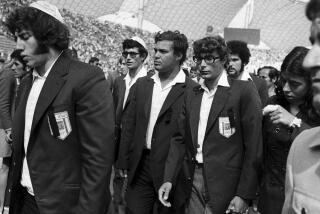More German Firms Probably Aided Iraq Weapons Effort, Official Says : War aftermath: Bonn economics minister calls initial findings of U.N. inspectors ‘altogether shocking.’
- Share via
BERLIN — A senior government official said Friday that it is likely that U.N. investigations into Iraq’s nuclear weapons program will reveal the names of more German companies that had helped build Iraqi President Saddam Hussein’s military arsenal.
In a parliamentary debate in Bonn, Economics Ministry State Secretary Klaus Beckmann described initial evidence gathered by a 45-member U.N. nuclear inspection team as “altogether shocking.”
“One must presume that the names of still more German companies will come to light as having helped arm Iraq in the area of ABC (atomic, biological and chemical) weapons and in missile technology,” Beckmann said. “It isn’t only German companies and experts who are involved, but there are no grounds for playing down their (German companies’) participation.”
A seven-page preliminary report by the U.N. inspectors was submitted to the Security Council earlier this week.
In disclosures that deeply embarrassed the Bonn government, German companies and technicians earlier this year were found to have been the key suppliers of equipment and technology for Iraq’s chemical weapons program and for upgrading its Scud missiles.
Those linked to weapons-related trade with Iraq included some of the cream of German industry, including aerospace giant Messerschmitt-Boelkow-Blom and machine tool producer Gildemeister AG.
The Economics Ministry is known to have compiled a confidential report late last year on German involvement in building Iraq’s war machine, including its nuclear weapons program.
A Wall Street Journal report earlier this week named three companies allegedly listed in the report, all small contractors known to have delivered material to Baghdad that could have been used in the construction of a gas centrifuge system. That system is one method used by Western countries to separate and gather small quantities of the highly fissionable uranium isotope U-235. It is required to build a nuclear bomb from the far larger amounts of non-fissionable U-238 normally found in the metal.
But U.N. inspectors said Iraq had probably relied on another, far older method of gathering U-235 by using magnetic separation, known as calutrons. U.S. scientists in the mid-1940s used calutrons to build the Hiroshima bomb but later discarded the expensive, obsolete technology.
The U.N. inspection team, which was led by an American David A. Kay and which was working on behalf of the International Atomic Energy Agency (IAEA), confiscated 40,000 pages of documents and videotaped other papers on a recent visit to Baghdad. Kay said the evidence led inspectors to believe that Iraq was within a year to 18 months of building an atomic bomb and was testing a missile system to deliver it. IAEA officials later said they believe Iraq also was engaged in developing a hydrogen bomb.
Although Kay and other officials at the Vienna-based IAEA found evidence linking Western suppliers with Baghdad offices procuring equipment for Iraq’s nuclear weapons program, they said such evidence required closer scrutiny to determine which companies may have acted illegally and which Western companies had engaged in harmless trade.
IAEA Director General Hans Blix indicated at a news conference last week in Vienna that companies that knowingly assisted the Iraqi nuclear weapons program would be named.
Under the U.N. resolution ending the Gulf War, the IAEA is charged with dismantling Iraq’s nuclear weapons program and has so far dispatched six teams to the region.
Beckman said the German government hopes to use evidence gathered by the U.N. inspectors to prosecute companies that violated the country’s export laws by shipping weapons materials or technology to Iraq.
Meantime, at the United Nations, the 15-member Security Council voted unanimously on Friday to ban Iraq’s atomic program altogether to prevent it from being used as a cover for secret weapons labs, and it also decided to indefinitely monitor Iraq’s weapons programs.
Iraqi Ambassador Abdul Amir Anbari protested that the council’s plan “puts Iraq under permanent trusteeship.” He said it was an affront to Iraqi sovereignty, illegal under international law and contrary to the U.N. Charter.
Under recommendations of the IAEA and the U.N. special commission that is destroying Iraq’s weapons, Baghdad’s nuclear industry will be totally dismantled. Iraq will only be allowed to use harmless isotopes for medical, industrial and geological survey purposes.
Iraq would have to submit reports every six months on projects with potential military application. It would also have to provide an inventory of all its nuclear installations and materials in 30 days and list all power plants producing more than 10 megawatts of electricity. Nuclear research requires huge amounts of electricity. U.N. and IAEA inspectors also will be permitted to go anywhere they want in Iraq, indefinitely.
More to Read
Sign up for Essential California
The most important California stories and recommendations in your inbox every morning.
You may occasionally receive promotional content from the Los Angeles Times.













